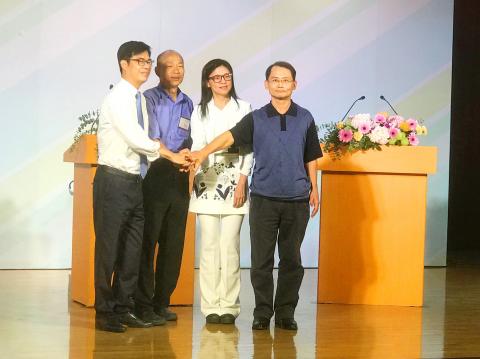Economic issues dominated a live TV “platform presentation” by the two main candidates in the Kaohsiung mayoral race yesterday.
Democratic Progressive Party Legislator Chen Chi-mai (陳其邁) said that Kaohsiung, the largest city in southern Taiwan, should try to strengthen its economy.
Developing tourism is one way to do so, he said.

Photo: copy by Ko Yu-hao, Taipei Times
Chen said he would improve Kaohsiung’s economy by developing the city as an Asian transportation hub, given its advantageous geographic location.
He said he would develop the high-tech industry in the city by building a semiconductor cluster and a technology corridor, while also encouraging an upgrade of the old economy sector so that it would become more competitive.
Chen also said he would also focus on green energy and a circular economy.
Chinese Nationalist Party (KMT) candidate Han Kuo-yu (韓國瑜) said that Kaohsiung, once a jewel in Taiwan’s crown, is a sleeping giant whose economy has slowed down over the past two decades.
The time has come for the giant to awaken, Han said.
Kaohsiung has an advantage in aviation and sea transportation, as well as promising fishing and agricultural industries, Han said, adding that it should build on those strengths.
However, many people in Kaohsiung have lost hope due to long-term economic stagnation, while the city’s population is shrinking, he said.
The city needs a new mayor to lead its economic revival, so the giant can rise up again, Han said.
Kaohsiung also needs a new leader to solve the problems that have caused the economic slowdown and to make it more attractive to investors, he said, adding that the biggest challenge for the next mayor would be to make Kaohsiung great again.
“I will lead Kaohsiung into the future as a youthful town, a rich town,” Han said. “People coming to Kaohsiung will say it is a huge city, fun to visit and even easier to make money in.”
In response to Shu Te University dean Chen Ching-yao (陳清燿), who asked how he intends to implement his platform, Chen Chi-mai cited his three-month term as acting mayor of then-Kaohsiung City in 2005 as evidence of his efficiency.
During his term, Chen said he demonstrated his ability to stand firm, to execute policies and to negotiate when he facilitated the city government’s retention of piers by staging talks between Taiwan International Ports Corp’s Kaohsiung branch, the Taiwan Railways Administration and the Ministry of National Defense.
However, Han said it was more important to cultivate trust among people.
If a majority of residents is angry and distrustful of the government, no policy, regardless how good or well-intentioned, could be pushed through, Han said.
The presentation also included independent candidates Chu Mei-feng (璩美鳳) and Su Ying-kuei (蘇盈貴), who lag far behind Chen and Han in opinion polls.

Chinese Nationalist Party (KMT) Chairman Eric Chu (朱立倫), spokeswoman Yang Chih-yu (楊智伃) and Legislator Hsieh Lung-chieh (謝龍介) would be summoned by police for questioning for leading an illegal assembly on Thursday evening last week, Minister of the Interior Liu Shyh-fang (劉世芳) said today. The three KMT officials led an assembly outside the Taipei City Prosecutors’ Office, a restricted area where public assembly is not allowed, protesting the questioning of several KMT staff and searches of KMT headquarters and offices in a recall petition forgery case. Chu, Yang and Hsieh are all suspected of contravening the Assembly and Parade Act (集會遊行法) by holding

PRAISE: Japanese visitor Takashi Kubota said the Taiwanese temple architecture images showcased in the AI Art Gallery were the most impressive displays he saw Taiwan does not have an official pavilion at the World Expo in Osaka, Japan, because of its diplomatic predicament, but the government-backed Tech World pavilion is drawing interest with its unique recreations of works by Taiwanese artists. The pavilion features an artificial intelligence (AI)-based art gallery showcasing works of famous Taiwanese artists from the Japanese colonial period using innovative technologies. Among its main simulated displays are Eastern gouache paintings by Chen Chin (陳進), Lin Yu-shan (林玉山) and Kuo Hsueh-hu (郭雪湖), who were the three young Taiwanese painters selected for the East Asian Painting exhibition in 1927. Gouache is a water-based

Taiwan would welcome the return of Honduras as a diplomatic ally if its next president decides to make such a move, Minister of Foreign Affairs Lin Chia-lung (林佳龍) said yesterday. “Of course, we would welcome Honduras if they want to restore diplomatic ties with Taiwan after their elections,” Lin said at a meeting of the legislature’s Foreign Affairs and National Defense Committee, when asked to comment on statements made by two of the three Honduran presidential candidates during the presidential campaign in the Central American country. Taiwan is paying close attention to the region as a whole in the wake of a

OFF-TARGET: More than 30,000 participants were expected to take part in the Games next month, but only 6,550 foreign and 19,400 Taiwanese athletes have registered Taipei city councilors yesterday blasted the organizers of next month’s World Masters Games over sudden timetable and venue changes, which they said have caused thousands of participants to back out of the international sporting event, among other organizational issues. They also cited visa delays and political interference by China as reasons many foreign athletes are requesting refunds for the event, to be held from May 17 to 30. Jointly organized by the Taipei and New Taipei City governments, the games have been rocked by numerous controversies since preparations began in 2020. Taipei City Councilor Lin Yen-feng (林延鳳) said yesterday that new measures by